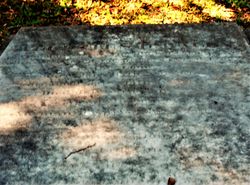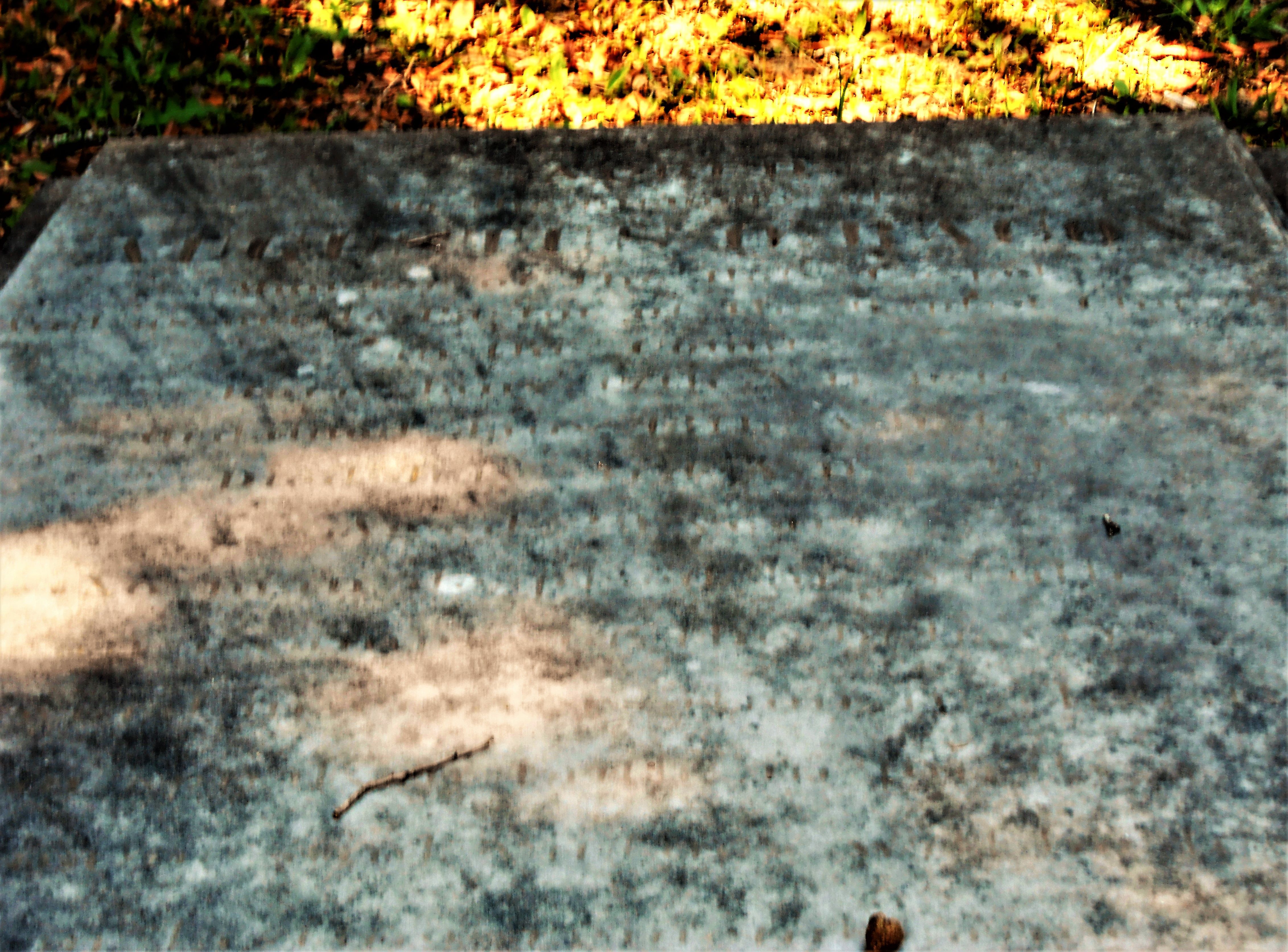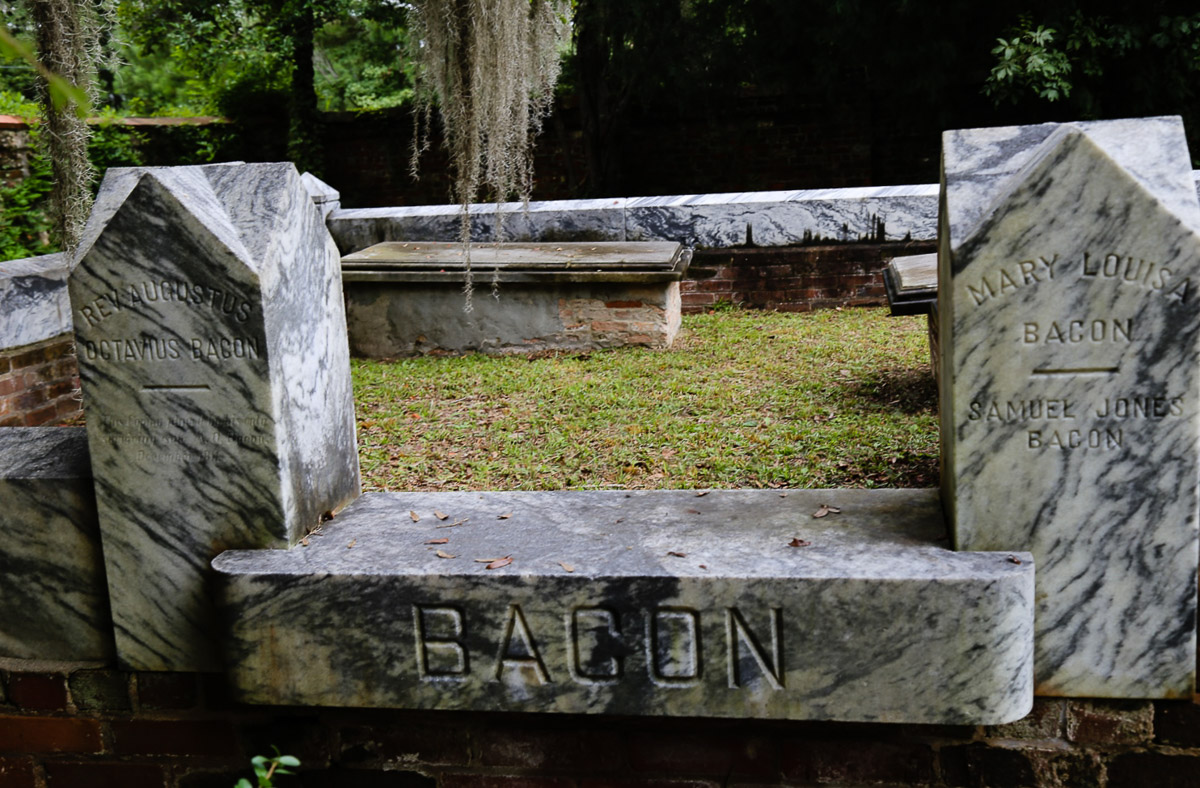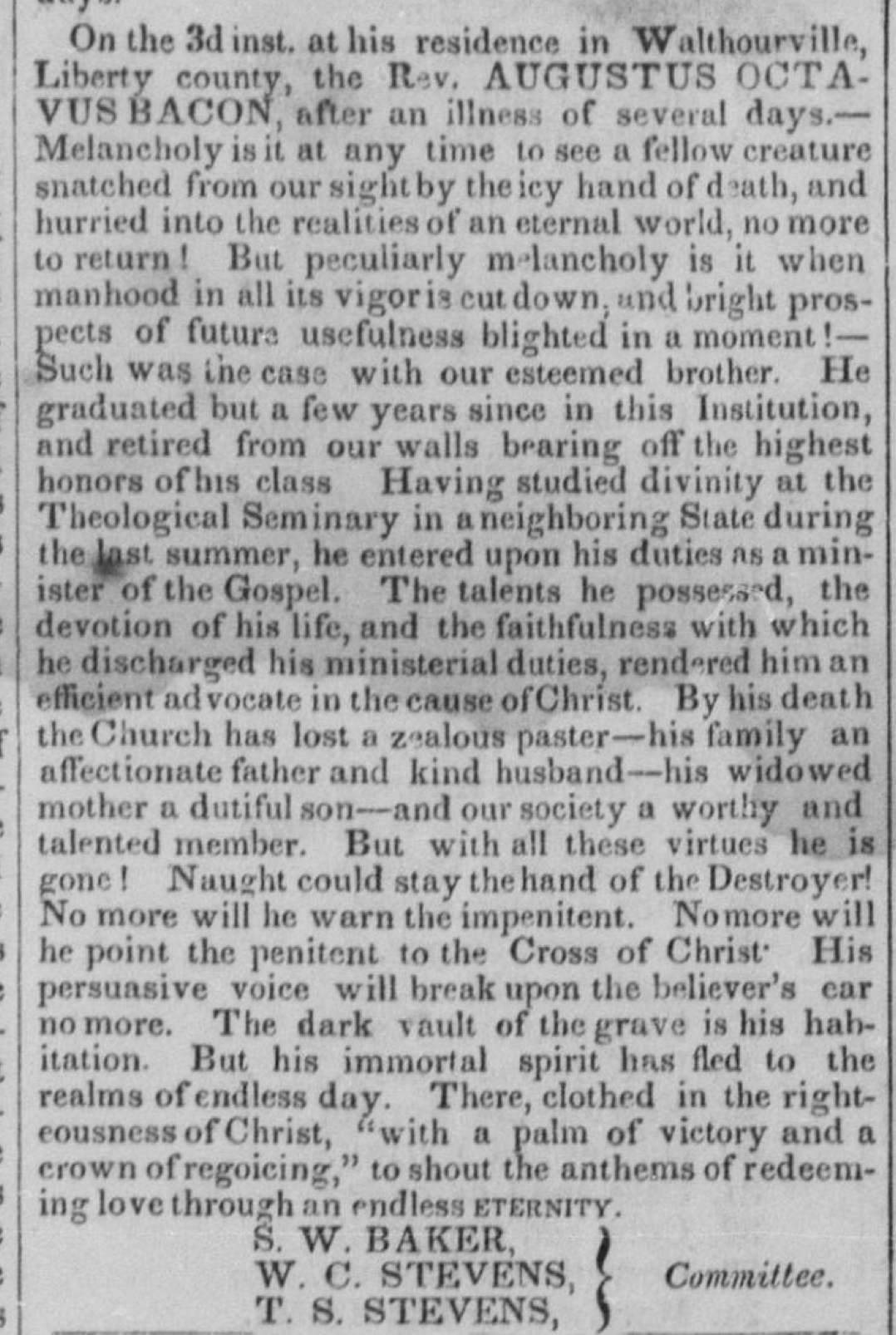AUGUSTUS 0. BACON.
Augustus 0. Bacon, the son of Thomas and Sarah H. Bacon, and grandson of the
late Rev. Dr. Holcombe, was born in Liberty county, Ga., on the 17th January,
1816. His parents were both, members of the Baptist church. They studiously and
prayerfully endeavored to imbue the mind of their son with the great principles
of Christianity, and to impress upon his heart and conscience the inestimable
value and importance of an early dedication of himself to the service of Christ.
Nor did they, while thus training him up for heaven, neglect the discipline and
cultivation of his mental faculties. He was sent at an early age to the best
school the neighborhood could afford, which was at Walthourville. Here he was
regularly prepared for college. As to his early history, it will be necessary to
say but little. From his childhood, his conduct was unexceptionable—he was famed
for his truth and integrity, and was singled out as a worthy example for those
of his own age. He strove to ascertain the path of duty, and when once
ascertained, pursued it with undeviating firmness. He was never known to do
deliberately what he conscientiously believed to be wrong. Such is the character
given him by those who were acquainted with his early days. The seed of divine
truth, which was faithfully and prayerfully sown in his heart at an early
period, took root, sprung up and brought forth fruit to the honor and glory of
God at the age of thirteen. Soon after his conversion, he united, himself to the
North Newport Baptist church, and continued up to the time of his leaving to
connect himself with college, a consistent and exemplary follower of the Lord
Jesus. He entered the Sophomore class, half advanced, of the University of
Georgia, at Athens, in January, 1834. While in college, his influence was both
extensive and salutary. He possessed a sound practical mind, fitted not so much
for show as for usefulness, united with great moral worth. By the dignity of his
mien, the firmness of his integrity, and the manliness of his piety, he won for
himself the esteem of the faculty, and the friendship of the students. His
consistency of character and amiable deportment rendered him a favorite in the
literary society in the University and among the citizens of the town. The whole
of his influence was exerted in the cause of virtue and religion. And whatever
plan was proposed, calculated to elevate the moral character of the college and
the students, met with his warm approbation and cordial support. Had he
continued his connection with the college, he would have taken his first degree
in August, 1836. But private business, of a pressing nature, called him away a
short time previous. In a letter to him, Dr. Church, the president of the
institution, remarks, "We all regretted your leaving before commencement,
knowing that, for your scholarship, you would have been entitled to one of the
first honors, and that the commencement exercises would have been most
creditably sustained, so far as you were concerned, had you taken your part in
them." Soon after leaving college, he was married to Miss Louisa Jones, of
Liberty county, a lady whose excellency of character, and amiable disposition,
and devoted piety, eminently qualified her to be an help meet for the faithful
minister of the Gross. In October, 1836, he became a member of the Theological
Seminary, in Columbia, South Carolina, with a view of preparing himself for the
ministry of reconciliation. Here, as elsewhere, his suavity of manners, his
exemplary conduct, and his ardent piety, gained him the love and the Christian
affection of both his instructors and his brethren. Here, as elsewhere, in all
his intercourse with the members of the seminary and with the citizens of
Columbia, he was the same high-minded and honorable man, and the same consistent
Christian.
A few extracts from letters, written to his friends during his stay in the
seminary, will more correctly and faithfully display his religious feelings than
any remarks from another pen. In a letter, dated 17th January, 1838, we have the
following reflections, suggested by the return of his birth day: "Twenty-two
years of my short life have gone, and what account have they borne with them!
Alas! it seems like a blank. I cannot see what I have lived for. When the slight
efforts to do good are brought into contrast with my slothfulness and
unfaithfulness, the former dwindle into insignificance. And then, when the sins
which have accompanied my best performances are taken into consideration, does
it not become me to acknowledge myself guilty? Where could we sinners hide our
heads, if it were not for the atoning blood of our Saviour? Here is our only
hope; let us cling to this."
In another letter, dated January 21st, 1838, his views respecting the sacred
ministry and the preparation necessary for the faithful and efficient discharge
of its duties are thus set forth:
"I begin to feel that my course of preparation for the ministry is rapidly
drawing to a close. The field is before me, and I am not fit to enter it. You
are aware, perhaps, that it is my intention, as far as I can see into the
future, to leave the seminary and commence preaching in July. This now seems to
me to be the path of duty. But, as I have already said, I am not prepared for
the work. My knowledge and mental discipline are by no means sufficient, and
what is more than all, I am very far from having the right spirit for a minister
of the gospel. I am too much inclined to lukewarmness and indifference. My
concern for the spiritual welfare of my fellow-creatures, and particularly of my
own friends and relatives, has never been what it should have been. Unless this
concern is increased, how can I be honored as an instrument of saving souls?"
After thus having spoken of his unworthiness to assume the ministerial
functions, he goes on and beautifully expresses his firm, unwavering confidence
in the providence of God:
"On one point I have reason to thank God that my feelings are more in
accordance with his word than they have ever been, before; and this is, that I
do not feel that anxiety in. which we are apt to indulge about what is to be my
lot in this world and what I shall be called to suffer or perform. It is
delightful to leave all these things in the hands of our heavenly father. If he
has any work for me to do, he will open the door before me and direct me in the
path of duty. He knows whether poverty and hardship will be most for my good,
and amidst all the changes and troubles of this world, he will not disregard
those whom he loves. No man's mere external circumstances can make him happy. It
is the state of the mind. I find in my own experience that nothing gives so much
calmness and contentment of mind as to cultivate the habit of trusting in God
for everything. Duty belongs to us. Let us leave results with God."
Once more we quote from a letter: "I find great difficulty in attending to
worldly business on one account. It is so hard to avoid setting our affections
on these things. What awful sinners we are! Were it not for the promise that
none of Christ's sheep will be lost, then there would indeed be reason for
discouragement, but here is our hope. He who conducted us thus far has promised
never to leave us nor forsake us. Let us live by faith, casting all our care
upon Him who is mighty to help."
After remaining here for two full sessions, he applied for a dismission on
June 16th, 1838, which was granted by the professors and couched in the
following language: "He has diligently attended the prescribed course of study,
maintained a consistent Christian character, conformed to all the regulations of
the institution, and is now dismissed at his own particular request. He carries
with him the confidence, the esteem and the sincere affection of each one of us."
In July, 1838, he was licensed to preach the gospel of Christ, and soon after
was invited by the North Newport Baptist church and the Sunbury Baptist church
to become an associate pastor with the Rev. J. S. Law. The invitation was
accepted, and as a preparatory step to his assuming all the duties of the
pastoral relation, he was ordained on the 13th of January, 1839.
He labored but a few months here in the active and faithful discharge of his
ministerial functions, before he was attacked by the fever. His last sermon to
his beloved flock was preached while he was suffering from that disease which in
a few days terminated his valuable life. In his last illness he endured much
physical pain, but having a conscience void of offence, both toward God and
toward man, he was not only patient and resigned, but even cheerful. Calm and
tranquil, the language of his soul seemed to be and doubtless was, "Not my will,
but thine, be done, 0 Lord." To his brothers and. sister, who clung around the
bedside of their beloved brother, he gave solemn warnings and exhortations upon,
the important subject of personal religion. Being asked how that Saviour whom he
was recommending to others appeared to himself, he replied, "There is none like
him, none like him."
These were his last words in regard to his own personal state, and are amply
sufficient to show with what feeling and with what hope he entered upon the
untried scenes of eternity. He breathed his last on the 3d of July, 1839, and
was buried the next day at Midway burying ground.
Thus died one who had endeared himself in all the relations of life, and is
embalmed in the memories of all who knew him. He had but a few months before
completed a course of study to prepare himself for the arduous and responsible
duties of the pastor and make himself an able and efficient minister of the new
covenant. But he was only permitted to look around upon the field of labor
allotted him by Divine Providence, to commence his duties, and then to die in
the midst of all his hopes and all his plans. How unsearchable are the judgments
of God, and his ways past finding out! Hon. A. O. Bacon, Speaker of the House in
the Georgia Legislature, is his only living child.
Additional Comments:
From:
GEORGIA BAPTISTS: HISTORICAL AND BIOGRAPHICAL
BY
J. H. CAMPBELL,
PERRY, GEORGIA.
MACON, GA.: J. W. BURKE & COMPANY. 1874.
AUGUSTUS 0. BACON.
Augustus 0. Bacon, the son of Thomas and Sarah H. Bacon, and grandson of the
late Rev. Dr. Holcombe, was born in Liberty county, Ga., on the 17th January,
1816. His parents were both, members of the Baptist church. They studiously and
prayerfully endeavored to imbue the mind of their son with the great principles
of Christianity, and to impress upon his heart and conscience the inestimable
value and importance of an early dedication of himself to the service of Christ.
Nor did they, while thus training him up for heaven, neglect the discipline and
cultivation of his mental faculties. He was sent at an early age to the best
school the neighborhood could afford, which was at Walthourville. Here he was
regularly prepared for college. As to his early history, it will be necessary to
say but little. From his childhood, his conduct was unexceptionable—he was famed
for his truth and integrity, and was singled out as a worthy example for those
of his own age. He strove to ascertain the path of duty, and when once
ascertained, pursued it with undeviating firmness. He was never known to do
deliberately what he conscientiously believed to be wrong. Such is the character
given him by those who were acquainted with his early days. The seed of divine
truth, which was faithfully and prayerfully sown in his heart at an early
period, took root, sprung up and brought forth fruit to the honor and glory of
God at the age of thirteen. Soon after his conversion, he united, himself to the
North Newport Baptist church, and continued up to the time of his leaving to
connect himself with college, a consistent and exemplary follower of the Lord
Jesus. He entered the Sophomore class, half advanced, of the University of
Georgia, at Athens, in January, 1834. While in college, his influence was both
extensive and salutary. He possessed a sound practical mind, fitted not so much
for show as for usefulness, united with great moral worth. By the dignity of his
mien, the firmness of his integrity, and the manliness of his piety, he won for
himself the esteem of the faculty, and the friendship of the students. His
consistency of character and amiable deportment rendered him a favorite in the
literary society in the University and among the citizens of the town. The whole
of his influence was exerted in the cause of virtue and religion. And whatever
plan was proposed, calculated to elevate the moral character of the college and
the students, met with his warm approbation and cordial support. Had he
continued his connection with the college, he would have taken his first degree
in August, 1836. But private business, of a pressing nature, called him away a
short time previous. In a letter to him, Dr. Church, the president of the
institution, remarks, "We all regretted your leaving before commencement,
knowing that, for your scholarship, you would have been entitled to one of the
first honors, and that the commencement exercises would have been most
creditably sustained, so far as you were concerned, had you taken your part in
them." Soon after leaving college, he was married to Miss Louisa Jones, of
Liberty county, a lady whose excellency of character, and amiable disposition,
and devoted piety, eminently qualified her to be an help meet for the faithful
minister of the Gross. In October, 1836, he became a member of the Theological
Seminary, in Columbia, South Carolina, with a view of preparing himself for the
ministry of reconciliation. Here, as elsewhere, his suavity of manners, his
exemplary conduct, and his ardent piety, gained him the love and the Christian
affection of both his instructors and his brethren. Here, as elsewhere, in all
his intercourse with the members of the seminary and with the citizens of
Columbia, he was the same high-minded and honorable man, and the same consistent
Christian.
A few extracts from letters, written to his friends during his stay in the
seminary, will more correctly and faithfully display his religious feelings than
any remarks from another pen. In a letter, dated 17th January, 1838, we have the
following reflections, suggested by the return of his birth day: "Twenty-two
years of my short life have gone, and what account have they borne with them!
Alas! it seems like a blank. I cannot see what I have lived for. When the slight
efforts to do good are brought into contrast with my slothfulness and
unfaithfulness, the former dwindle into insignificance. And then, when the sins
which have accompanied my best performances are taken into consideration, does
it not become me to acknowledge myself guilty? Where could we sinners hide our
heads, if it were not for the atoning blood of our Saviour? Here is our only
hope; let us cling to this."
In another letter, dated January 21st, 1838, his views respecting the sacred
ministry and the preparation necessary for the faithful and efficient discharge
of its duties are thus set forth:
"I begin to feel that my course of preparation for the ministry is rapidly
drawing to a close. The field is before me, and I am not fit to enter it. You
are aware, perhaps, that it is my intention, as far as I can see into the
future, to leave the seminary and commence preaching in July. This now seems to
me to be the path of duty. But, as I have already said, I am not prepared for
the work. My knowledge and mental discipline are by no means sufficient, and
what is more than all, I am very far from having the right spirit for a minister
of the gospel. I am too much inclined to lukewarmness and indifference. My
concern for the spiritual welfare of my fellow-creatures, and particularly of my
own friends and relatives, has never been what it should have been. Unless this
concern is increased, how can I be honored as an instrument of saving souls?"
After thus having spoken of his unworthiness to assume the ministerial
functions, he goes on and beautifully expresses his firm, unwavering confidence
in the providence of God:
"On one point I have reason to thank God that my feelings are more in
accordance with his word than they have ever been, before; and this is, that I
do not feel that anxiety in. which we are apt to indulge about what is to be my
lot in this world and what I shall be called to suffer or perform. It is
delightful to leave all these things in the hands of our heavenly father. If he
has any work for me to do, he will open the door before me and direct me in the
path of duty. He knows whether poverty and hardship will be most for my good,
and amidst all the changes and troubles of this world, he will not disregard
those whom he loves. No man's mere external circumstances can make him happy. It
is the state of the mind. I find in my own experience that nothing gives so much
calmness and contentment of mind as to cultivate the habit of trusting in God
for everything. Duty belongs to us. Let us leave results with God."
Once more we quote from a letter: "I find great difficulty in attending to
worldly business on one account. It is so hard to avoid setting our affections
on these things. What awful sinners we are! Were it not for the promise that
none of Christ's sheep will be lost, then there would indeed be reason for
discouragement, but here is our hope. He who conducted us thus far has promised
never to leave us nor forsake us. Let us live by faith, casting all our care
upon Him who is mighty to help."
After remaining here for two full sessions, he applied for a dismission on
June 16th, 1838, which was granted by the professors and couched in the
following language: "He has diligently attended the prescribed course of study,
maintained a consistent Christian character, conformed to all the regulations of
the institution, and is now dismissed at his own particular request. He carries
with him the confidence, the esteem and the sincere affection of each one of us."
In July, 1838, he was licensed to preach the gospel of Christ, and soon after
was invited by the North Newport Baptist church and the Sunbury Baptist church
to become an associate pastor with the Rev. J. S. Law. The invitation was
accepted, and as a preparatory step to his assuming all the duties of the
pastoral relation, he was ordained on the 13th of January, 1839.
He labored but a few months here in the active and faithful discharge of his
ministerial functions, before he was attacked by the fever. His last sermon to
his beloved flock was preached while he was suffering from that disease which in
a few days terminated his valuable life. In his last illness he endured much
physical pain, but having a conscience void of offence, both toward God and
toward man, he was not only patient and resigned, but even cheerful. Calm and
tranquil, the language of his soul seemed to be and doubtless was, "Not my will,
but thine, be done, 0 Lord." To his brothers and. sister, who clung around the
bedside of their beloved brother, he gave solemn warnings and exhortations upon,
the important subject of personal religion. Being asked how that Saviour whom he
was recommending to others appeared to himself, he replied, "There is none like
him, none like him."
These were his last words in regard to his own personal state, and are amply
sufficient to show with what feeling and with what hope he entered upon the
untried scenes of eternity. He breathed his last on the 3d of July, 1839, and
was buried the next day at Midway burying ground.
Thus died one who had endeared himself in all the relations of life, and is
embalmed in the memories of all who knew him. He had but a few months before
completed a course of study to prepare himself for the arduous and responsible
duties of the pastor and make himself an able and efficient minister of the new
covenant. But he was only permitted to look around upon the field of labor
allotted him by Divine Providence, to commence his duties, and then to die in
the midst of all his hopes and all his plans. How unsearchable are the judgments
of God, and his ways past finding out! Hon. A. O. Bacon, Speaker of the House in
the Georgia Legislature, is his only living child.
Additional Comments:
From:
GEORGIA BAPTISTS: HISTORICAL AND BIOGRAPHICAL
BY
J. H. CAMPBELL,
PERRY, GEORGIA.
MACON, GA.: J. W. BURKE & COMPANY. 1874.
Family Members
Advertisement
Advertisement















